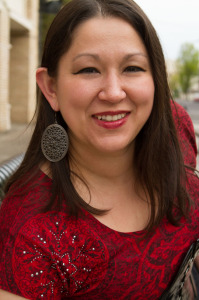 I’m not the world’s best cook by any means. If given the option, to steal more time for writing I will order in or use prepackaged dinners. But there are things I make when I need that extra comfort that take-out or microwave meals won’t provide. It was no surprise that one of my favorite home-made meals made its way into my novel Chaos Wolf.
I’m not the world’s best cook by any means. If given the option, to steal more time for writing I will order in or use prepackaged dinners. But there are things I make when I need that extra comfort that take-out or microwave meals won’t provide. It was no surprise that one of my favorite home-made meals made its way into my novel Chaos Wolf.
In that scene, Jordan is due to present herself to the alpha werewolf of the Black Oak Pack for one final test. Alpha Shane has made it clear that if she can’t prove that she is in control her shapeshifting, he will kill her. She has just confronted Montgomery, her vampire mentor, about information he has withheld from her. Her trust in him is shaken when she needs his support the most. She’s exhausted emotionally and physically and needs something she can look forward to beyond mere survival. So she cooks.
Jordan doesn’t toss something into the microwave that warms up in two minutes. She doesn’t reach for the take-out cartons from the dinner the night before. She chooses to make a meal that will take a half hour to prepare and ten hours to cook.
In an act of quiet defiance against all of those who think she’s going to fail, Jordan chooses to hope that she will be there to eat it when it’s done. In her mind, it’s not her last meal, but her next meal to look forward to when she returns home.
I have made crockpot short ribs many times. It’s a recipe my mother taught me, and now I make it for her. I can throw it in the slow cooker when I leave for work and it’s ready when I get home. Any crockpot with a low, medium, or high heat setting can be used. I make it when I know I’m going to have a rough day and want something comforting when I get home. While it won’t win any plating awards on cooking shows, it is a delicious and satisfying meal.
Crockpot Short Ribs
3.5 Lbs. Bone In Short Ribs
6 Russet Potatoes
1.5 lb. Carrots
2 large Yellow Onions
3 Tablespoons Garlic Salt
7 Quart Crockpot
- Peel and slice half the potatoes into coins and cover the bottom of the crockpot.
- Cut the carrots into chunks and layer over the potatoes. I cheat here by using bagged baby carrots.
- Cut your yellow onion into eights and layer over the carrots.
- Sprinkle 1 tablespoon of garlic salt on top.
- Repeat with another layer of potatoes, carrots, onions and garlic salt.
- Place the ribs on top of all the vegetables. Sprinkle with the rest of the garlic salt.
- Cover with lid and cook on low heat for ten hours. If you want to do it the “fast” way and don’t mind tougher meat, cook on high for four to five hours.
- By the end, the fat on the ribs should have melted and the potatoes and carrots will be tender. Remove the bones and serve in a bowl.
Does Jordan get to enjoy her meal? You’ll have to read the book to find out.
 About the Author: Sheryl R. Hayes can be found untangling plot threads or the yarn her cats have been playing with. In addition to writing, she is a cosplayer focusing on knit and crochet costumes and works full time at a Bay Area water company. You can follow her at her blog, on Twitter, or on Facebook.
About the Author: Sheryl R. Hayes can be found untangling plot threads or the yarn her cats have been playing with. In addition to writing, she is a cosplayer focusing on knit and crochet costumes and works full time at a Bay Area water company. You can follow her at her blog, on Twitter, or on Facebook.
Here’s a sneak peek at Chaos Wolf:
Bitten by a werewolf. Taught by a vampire. At this rate, she’s going to start a war.
Literature major Jordan Abbey ordered a double mocha latte, but it wasn’t supposed to come with a side order bite by a love-sick werewolf. When a vampire comes to her rescue, gut instinct tells her he has questionable motives. But he’s the only one she can trust to help get in touch with her inner animal.
Within a week, her smart mouth lands her in trouble with the hostile alpha of the local pack and the stiff-necked vampire elder. She now has less than a moon cycle to master shape changing… or else. And the besotted werewolf who started this whole mess is stalking Jordan and killing her friends. He won’t take no for an answer.
In the Northern California town of Rancho Robles where the children of the Wolf and the Bat share an uneasy coexistence, one woman makes an epic mess of the status quo.
Chaos Wolf Excerpt
 He gestured toward the couch. “Would you like tea, coffee, or soda?”
He gestured toward the couch. “Would you like tea, coffee, or soda?”
“Soda, please.” Although she wasn’t thirsty, accepting what he offered seemed the polite thing to do. She sat down on the leather couch and rested her elbows on her knees. “Don’t you only drink”¦ um”””
“Blood?” Montgomery finished the question for her. “No.” He stepped into the kitchenette. “I can and do drink and eat other things. It’s kind of like eating junk food. There’s no nutritional value. I enjoy the flavors and textures. I don’t like to do it too often, though.”
Jordan tilted her head to one side. “Why not?”
His lip curled into a half smile. “I can’t digest matter like when I was mortal,” he explained. “I have to purge it in a different way.”
She blinked, puzzling it out. Understanding dawned on her face. “Oh”¦ Oh!”
One red-and-silver can in hand, Montgomery stepped out of the kitchenette. “When I last saw you, you were hightailing it out of here, never to return.” He gave her the soda and took a seat in the chair sitting at a right angle to the couch. “What happened?”
Jordan stared down at the soda and rubbed her thumb over the frosty top. “After I left, I went home. I didn’t tell anyone about you.” She gestured in Montgomery’s direction. “I went out to try to forget what happened. When I came back, I found out my roommate’s boyfriend had been mauled to death.”
Montgomery stiffened. “Did you see the werewolf?”
“No,” Jordan said. “I didn’t even think he was real until”¦” She paused and shivered, sloshing the soda in the can. “All I could think about was finding you.”
Montgomery’s lips moved to form a curse. “Did you come directly here?” He stood up and crossed the small space separating the chair and the couch. “Focus. It’s important. Do you think you were followed?”
“No. The police took me and Molly to the station. We’re not allowed to go back to our apartment until sometime tomorrow after the super gets someone in to”¦” Jordan’s voice broke. She swallowed. “Clean up. I spent two hours getting on and off buses to make sure I wasn’t followed.”
Montgomery sat down on the couch. “Good thinking. If the werewolf was following you by scent, that should have thrown him off your trail. If he was tracking you by sight, you would have spotted him. Or he would have broken in here by now. You’ve been lucky.”
“Lucky?” Jordan’s shoulders tightened and her fist clenched, denting the can inward. “I’m being stalked by something out of a horror film and you think I’m lucky?”
“Yes,” Montgomery countered. “If you had been there instead of your friend, the werewolf would have finished what he started.”
“Finished what he started?” Jordan put the soda on the table unopened. “You make it sound like he let me live.”
“He did,” Montgomery stated, as if it were the most obvious thing in the world.
She stared at him with an open mouth. All the movies and books she had seen taught that a werewolf would rip out her throat as soon as look at her. The female victim never survived the attack. “But why?”
“You haven’t figured it out yet?” Montgomery appeared nonplussed by her reaction. “He wasn’t trying to make a meal out of you, Jordan. He was claiming you as his mate.”
Enjoy this writing advice and want more content like it? Check out the classes Cat gives via the Rambo Academy for Wayward Writers, which offers both on-demand and live online writing classes for fantasy and science fiction writers from Cat and other authors, including Ann Leckie, Seanan McGuire, Fran Wilde and other talents! All classes include three free slots.
If you’re an author or other fantasy and science fiction creative, and want to do a guest blog post, please check out the guest blog post guidelines.






 I remember getting a rush of rejections, one after another, on stories I’d poured my soul into. I wasn’t hitting the right notes somewhere, and it was time to figure out where. Yet I joined writing games with a casual attitude, logging less than a hundred words per challenge. I had good ideas, but I’d edit my sentences as I went, placing structure and grammar above word count. Others did four or five times my number of words in the ten to fifteen minutes per prompt, and even though I knew the writing gems appeared in unfettered prose, I couldn’t stop fixing things. It wasn’t satisfying, and soon I was back to one or two sessions a month.
I remember getting a rush of rejections, one after another, on stories I’d poured my soul into. I wasn’t hitting the right notes somewhere, and it was time to figure out where. Yet I joined writing games with a casual attitude, logging less than a hundred words per challenge. I had good ideas, but I’d edit my sentences as I went, placing structure and grammar above word count. Others did four or five times my number of words in the ten to fifteen minutes per prompt, and even though I knew the writing gems appeared in unfettered prose, I couldn’t stop fixing things. It wasn’t satisfying, and soon I was back to one or two sessions a month.